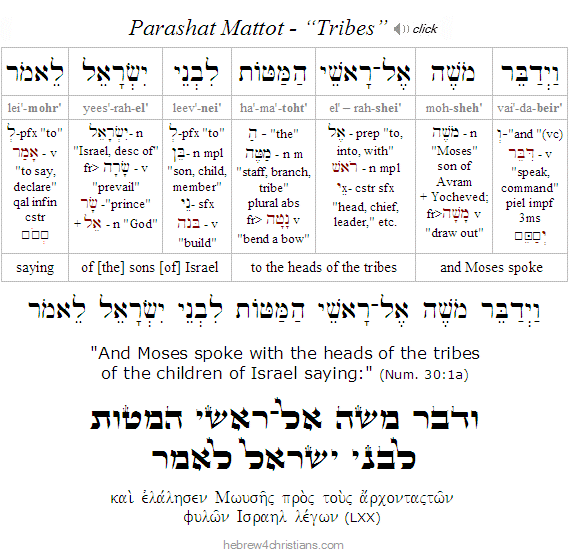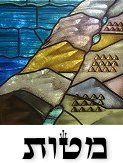|
|
 |
 |
 |
 |
|
Weekly Torah Reading
|
|
|
|
Parashat Mattot ("tribes")
|
|
|
Click on the links to display the Scriptures:
|
|
|
|
 |
 |
 |
|
Torah Reading Overview
|
|
|
|
Last week's parashah (Pinchas) ended with instructions regarding daily sacrificial offerings (tamid) and additional (musaf) offerings for Shabbat and festivals of the Jewish year (mo'edim).
This week's parashah (often combined with Masei) begins with the LORD giving instructions regarding the making of vows (nedarim). Any pledge made by a man in the name of the LORD must be fulfilled. A woman's vow, however, can be overturned and annulled by her father or husband on the day he learns of it (otherwise, the vow is considered fully obligatory, just as a man's vow).
The parashah begins:
|
|
|
 |
 |
|
Moses spoke to the heads of the tribes of the people of Israel, saying, "This is what the LORD has commanded. (Num 30:1[2h])
|
 |
 |
|
Laws about Vows (nedarim)...
|
 |
 |
|
The words we use are important and represent our characters. Lying and deception are indicative of unbelief. Making a promise to do something -- making a vow -- is serious matter, as the Messiah Yeshua taught us (Matt. 5:33-37; 12:36-37). Whenever we give our word, we are expected to keep it...
In Orthodox Jewish circles, it is not uncommon to hear the phrase, b'li neder (בְּלִי נֶדֶר) after someone says they will do something (bli means "without" and neder means a promise). If someone says, "I am going to visit my sick aunt," he will often add "bli neder" in order to avoid breaking his word (when the intent is stated in writing, the qualification is sometimes abbreviated as B"N).
The Torah states plainly: "If a man vows a vow to the LORD, or swears an oath to bind himself by a pledge, he shall not break his word. He shall do according to all that proceeds out of his mouth" (Num. 30:2).
For men, this is straightforward, and only later did the sages develop rules for escaping the demand of a promise. According to such halakhah (law), a vow may be "undone" if the promiser goes before a Bet Din (court) or before a talmid chacham (sage) to explain his careless promise. They then ask him, "If you had known such-and-such were the consequences, would you still have made your vow?" If the man answers no, then he is free from the vow. This is sometimes called ha-tarat nedarim (הַתָּרַת נְדָרִים), the "purification [or annulment] of vows." It is customary to perform ha-tarat nedarim on the day before Rosh Hashanah, in anticipation of the Kol Nidre ceremony of Yom Kippur.
On the other hand, if a father overhears a child make a promise he does not agree with, he can say, "I nullify your promise." The husband of a wife who makes a vow is likewise subject to her husband's approval (or lack thereof). In both cases, however, the nullification is valid only until sunset on the day he hears it. If he waits until after sunset, the promise must be kept - just as with a promise made by a man.
Some vows in the Scriptures are not condemned. For example, Jacob's vow (at Bethel) to give the LORD a tenth of everything he owned if he returned safely to Canaan is not considered foolish. Nor is the Nazirite vow regarded as bad in and of itself. And of course God's vows are precious to those who trust in Him. We must be careful, however, to remember that God will call each person into account for the words he or she has spoken.
|
 |
 |
 |
 |
 |
 |
 |
|
Vengeance on Midian...
|
|
|
|
The LORD then commanded Moses to wage war against the Midianites for their role in plotting the moral destruction of Israel (through the evil counsel of Balaam of Beor). Led by Pinchas (a type of Mashiach Yeshua), 12,000 Israelite warriors (1,000 from each tribe) attacked and killed every male Midianite - including the archenemy Balaam and the five kings of Midian. Jewish Midrash includes elaborate stories about the tactics of Balaam and how he used the power of tumah (uncleanness) to fly in the air, etc., to evade capture, but it suffices to understand the p'shat here: Balaam was killed in the holy warfare.
When the victorious Israelites returned to the camp, they took Midianite women, children, cattle and other possessions as spoils of war. Moses was not happy about this and reprimanded the soldiers for keeping the women alive (since they were the cause of the plague on the Jews in the first place). He therefore ordered that all the Midianite women and boys to be executed (though the 16,000 virgin girls were made slaves).
The warriors, unclean by contact with the dead, were then required to stay outside the camp (of the Levites and Mishkan) for seven days to undergo ritual purification. All of their garments and the spoils of ware were cleansed according to Eleazar the High Priest's instructions (i.e., what later came to be known as the laws of hag'alah (הַגְעָלָה) or "kashering" by passing through the fire or through water).
The spoils of war were then divided equally between the warriors on the one hand, and entire congregation on the other hand. The soldiers - grateful for their miraculous victory (not a single Jew was killed) - contributed 1/50th of their spoils to the Levites and made an additional freewill offering at the Mishkan.
|
|
|
Jewish Midrash about the battle
|
|
|
|
According to various midrashim, Balaam (ie., Bil'am) was as great a sorcerer as Moses was a tzaddik, and the battle with Midian amounted to a power encounter between these two wonder-workers. Balaam is portrayed as using magical powers of tumah (impurity) to war against Israel, whereas Moses (through Pinchas) relied upon God's power.
In the ensuing battle, Balaam is finally undone by the power of Pinchas' anointing as the leader of the armies of Israel. There are various versions of how Balaam actually was killed, however. One midrash says Pinchas himself drew a sword and killed him, but the Talmud (Sanhedrin 106b) relates that Balaam was captured and brought before Moses and the leaders of Israel to stand trial, where he was found guilty and was executed.
|
|
|
|
Reuben and Gad's Request to settle in Gilead
|
|
|
|
The tribes of Reuben and Gad asked permission to settle in the pasture land of Gilead (on the east of the Jordan), since they had large herds of cattle. At first Moses hotly disapproved of their request, since he feared that the other tribes would lose heart if these two tribes stayed behind during the conquest of Canaan. However, when the tribal leaders promised that they intended to join the fight while their families remained in Gilead, Moses finally agreed - but charged Yehoshua (Joshua) with ensuring that they kept their promise, otherwise they would forfeit any claim to settle in Gilead.
It is noted, at the end of the parashah, that half of the tribe of Manasseh joined the tribes of Reuben and Gad in settling the territories east of the Jordan. Some of the Jewish sages believe that Manasseh was the servant of Joseph in Egypt who accused the brothers of stealing the ruler's cup, and this caused the brothers to tear their garments (Gen. 44). Because Manasseh caused this, a portion of his inheritance was to be torn in half.
Later on, in the book of Yehoshua, we read how the two and a half tribes erected a mizbe'ach (altar) on the east side of Jordan, and this nearly caused a civil war among the Israelites (Joshua 22:9-ff). Indeed, because they were separated from their brothers, these three tribes were the first ones carried into captivity by the Assyrians (c. 740 BC).
|
|
|
 |
|
|
|
Haftarah Reading Overview
|
|
 |
 |
|
There are three Haftarot that are read during the Three Weeks of Sorrow. Collectively they are sometimes called "the Haftarahs of Rebuke (musar)." In all three, Jeremiah describes punishments that will befall the people if they do not return to the LORD, but also promises redemption if they do. The choice is theirs.
Since the Temple was destroyed and Judah was ultimately taken into captivity, it is interesting to read a key verse from the Haftarah: "Before I formed you in the womb I knew you, and before you were born I consecrated you; I appointed you a prophet to the nations" (Jeremiah 1:5 ). How are we to understand our responsibility in light of the overarching sovereignty of the LORD?
Judaism's traditional response is a form of "compatibalism" - although the LORD determines everything, people still have the responsibility to make choices. The sages explained this paradox in Pirkei Avot 3:15 -- "All is foreseen, yet freedom of choice is given. God judges the world according to the good, yet everything depends on the majority of what has been done."
During the Three Weeks of Sorrow, we are to look at our own lives and seek teshuvah - repentance. We are responsible for the choices we make - whether to return to the LORD or to continue to idolize our selfishness - but the LORD has the last word in the destination of our lives. "The heart of man plans his way, but the LORD establishes his steps" (Proverbs 16:9). How you reconcile this paradox will reveal a good deal about your own personal relationship with the LORD.
|
 |
 |
 |
 |
 |
|
 |
|
|
|
Brit Chadashah Overview
|
|
|
|
The reading from the Brit Chadashah is from the gospel according to Matthew, and concerns the Lord Yeshua's views about nedarim (vows). Yeshua plainly warns us not take any vows at all, but to be entirely truthful in all our communications. For the one who obeys the truth, oaths are unnecessary. The worse men are, the less they are bound by them; the better they are, the less there is need for them.
We must be on our guard here. The words we use to communicate matter to God, and have implications that far transcend what we normally consider. There is no "chatter" in the Kingdom of Heaven; there is no idle talk or insignificant utterance. Not one. All our words will prove to be entirely prophetic. As Yeshua later teaches:
"I tell you, on the day of judgment people will give account for every careless word they speak, for by your words you will be justified, and by your words you will be condemned" (Matt 12:36-37).
Our use of language is intrinsic to the image and likeness of God that we are privileged to bear. It is one of God's greatest gifts to us, and we are responsible to use it to heal, bring life, and to proclaim the message of the gospel to others. When we speak hastily, out of anger, or in a fit of some carnal passion, we pervert the image of God - and we will be called to account for our words.
May the LORD God of Israel help us to speak the truth in love to one another (Eph 4:35).
Blessing:
|
 |
|
|
 |
|
|
 |
 |
|
Related Discussion:
|
|
|
|
 |
 |
|
Hebrew Audio Files:
|
|
 |
 |
|
Click the following links to hear the desired chapters read from this week's Torah:
|
|




